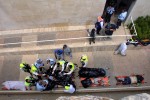The intensifying Israeli-Palestinian peace negotiations have caused opponents of a Palestinian state to revive former Israeli prime minister Golda Meir’s 1969 canard that “there is no such thing as a Palestinian people.” However, “Palestine denial” is less a debating point than a conversation- stopper: if there are no Palestinians, then there is no Palestinian-Israeli conflict, and thus no need even to discuss West Bank policies. One problem: Palestinians do, in fact, exist.
In December, Israeli diplomat Danny Ayalon posted a YouTube video entitled “The Real Truth About Palestine,” in which he claimed that Palestine is a place, not a nation: “Like Antarctica, the Amazons or Sahara, naming a place doesn’t create a nation of Antarcticans or Saharans.” And in a recent Front Page Magazine essay, Hoover Institution scholar Bruce Thornton referred to “the so-called Palestinians” and stated that the very idea of a Palestinian nation is but “a device for promoting the incremental war against Israel.”
In 2012, three U.S. Republican presidential candidates endorsed Palestine denial: Newt Gingrich called Palestinians “an invented people”; Rick Santorum said “there are no Palestinians … all the people who live in the West Bank are Israelis”; and Herman Cain referred to “the so-called Palestinian people.”
Palestine denial, like Holocaust denial, is easily refuted. Most historians, since the publication of Benedict Anderson’s book Imagined Communities three decades ago, have accepted that every people is invented, some very recently.
Italian consciousness dates to 1764 and, until 1871, Italy wasn’t a country. Earlier residents considered themselves Neapolitans or Venetians or Florentines, and their primary loyalties were to their religion or ruler. But “Italian” is not a timeless identity, nation, or people.
Before a UCLA professor coined “Asian American” in 1968, Americans whose backgrounds were Chinese or Filipino or Japanese weren’t really part of a unified ethnic group. Yet the government now applies census and voting-rights laws to Asian Americans as if they existed – which, today, they do.
Czechoslovakia, carved from former Austro-Hungarian territory containing mostly Czechs but also Germans and Slovaks, lasted from 1918 to 1992. But the state was only partially successful in creating a unified Czechoslovakian identity out of those ethnicities. The joke among Jewish historians is that there were Czechs and Slovaks, but the only Czechoslovaks were the Jews of Prague.
Being Jewish is itself an invented identity. Though Judaism is thousands of years old, it’s not ageless. Ancient concepts of tribes and kingdoms differ greatly from today’s nation idea. In fact, Hebrew has a different word for biblical peoplehood (am) and modern nationhood (l’om). Jewish nationalism traces only to the late 1800s, when secular European Jews faced rising nationalist antisemitism in their countries of residence, as expressed in France’s Dreyfus Affair and the Russian pogroms. The central Zionist myth of uninterrupted but dispersed Jewish nationhood with consistent identity tracing to biblical times and finally gathering in modern Israel is historically inaccurate.
Palestinian identity and peoplehood started in the early 20th century, but intensified after the events of 1948 and 1967. The Palestinian nation then developed a strong sense of shared history and future, grievance and aspiration. It has a flag, a shared language (Palestinian Arabic), particular cuisine and a varied literary canon.
Palestine denial is hackneyed and utterly predictable. Its followers boast of the following 1977 citation by Zuheir Muhsain of the Palestine Liberation Organization’s pan-Arabist faction: “The Palestinian people does not exist. The creation of a Palestinian state is only a means for continuing our struggle against the state of Israel.” The obsession over a hoary 35-year-old quote from a Palestinian with a minority viewpoint suggests no other textual evidence exists.
Deniers also champion Mark Twain’s 1867 Innocents Abroad, always using the same passage, which describes Palestine in part as a “desolate country” where Twain “never saw a human being on the whole route.” But this 68-word mantra, presented as a single coherent opinion, selectively combines sentences and phrases from pages 488, 520 and 555 of the travelogue. Never mentioned are Twain’s half-dozen anecdotes about encounters with Arabs in Palestine. Innocents Abroad actually offers more support to the Palestinian narrative than the Zionist one.
Finally, West Bank residents are purportedly just a motley collection of Arab economic migrants, not a unified nation. Of course, the United States was also populated by economic migrants, and everyone recognizes the American people.
Denial rhetoric invalidates Palestinian rights by contradicting common sense and nearly all nationalism scholarship. It also leads to very strange questions. Are Italians a nation? Do Pakistanis (a 75-year-old identity) deserve a state? Should we tell a person who says she’s Asian American, “No, you’re not”?
Opponents of a Palestinian state can raise many legitimate points. But the “myth of Palestine” is not one of them. The idea needs to be retired, so real discussions about the Israeli and Palestinian futures can start.
David Benkof has a master’s degree in modern Jewish history from Stanford. He teaches Hebrew in Jerusalem. He can be reached at [email protected].

